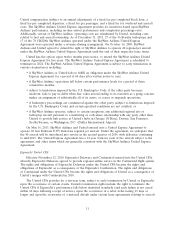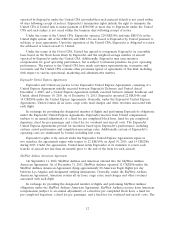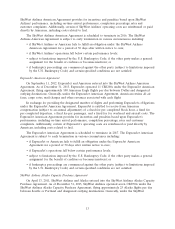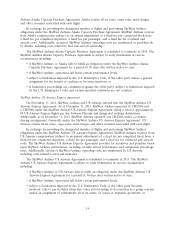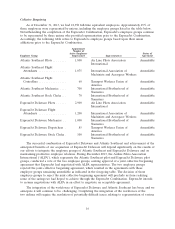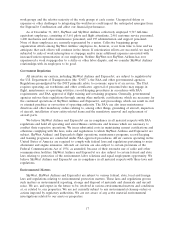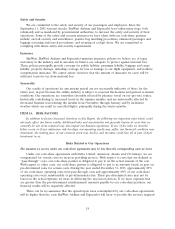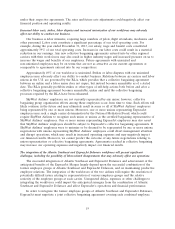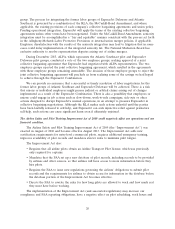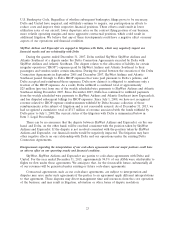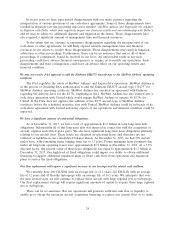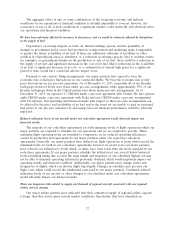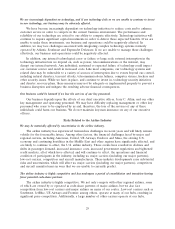SkyWest Airlines 2013 Annual Report Download - page 25
Download and view the complete annual report
Please find page 25 of the 2013 SkyWest Airlines annual report below. You can navigate through the pages in the report by either clicking on the pages listed below, or by using the keyword search tool below to find specific information within the annual report.group. The process for integrating the former labor groups of ExpressJet Delaware and Atlantic
Southeast is governed by a combination of the RLA, the McCaskill-Bond Amendment, and where
applicable, the existing provisions of each company’s collective bargaining agreements and union policy.
Pending operational integration, ExpressJet will apply the terms of the existing collective bargaining
agreements unless other terms have been negotiated. Under the McCaskill-Bond Amendment, seniority
integration must be accomplished in a ‘‘fair and equitable’’ manner consistent with the process set forth
in the Allegheny-Mohawk Labor Protective Provisions or internal union merger policies, if applicable.
Employee dissatisfaction with the results of the seniority integration may lead to litigation that in some
cases could delay implementation of the integrated seniority list. The National Mediation Board has
exclusive authority to resolve representation disputes arising out of airline mergers.
During December 2013, ALPA, which represents the Atlantic Southeast pilot and ExpressJet
Delaware pilot groups, conducted a vote of the two employee groups, seeking approval of a joint
collective bargaining agreement that ExpressJet had negotiated with ALPA representatives. The two
employee groups rejected the joint collective bargaining agreement, which resulted in the agreements
with those employee groups remaining amendable. The decision of those employee groups to reject the
joint collective bargaining agreement will preclude us from realizing some of the savings we had hoped
to achieve through the ExpressJet Combination.
We can provide no assurance that a successful or timely resolution of labor negotiations for the
former labor groups of Atlantic Southeast and ExpressJet Delaware will be achieved. There is a risk
that unions or individual employees might pursue judicial or arbitral claims arising out of changes
implemented as a result of the ExpressJet Combination. There is also a possibility that employees or
unions could engage in job actions such as slow-downs, work-to-rule campaigns, sick-outs or other
actions designed to disrupt ExpressJet’s normal operations, in an attempt to pressure ExpressJet in
collective bargaining negotiations. Although the RLA makes such actions unlawful until the parties
have been lawfully released to self-help, and ExpressJet can seek injunctive relief against premature
self-help, such actions can cause significant harm even if ultimately enjoined.
The Airline Safety and Pilot Training Improvement Act of 2009 could negatively affect our operations and our
financial condition.
The Airline Safety and Pilot Training Improvement Act of 2009 (the ‘‘Improvement Act’’) was
enacted in August of 2010 and became effective August 2013. The Improvement Act adds new
certification requirements for entry-level commercial pilots, requires additional emergency training,
improves availability of pilot records and mandates stricter rules to minimize pilot fatigue.
The Improvement Act also:
• Requires that all airline pilots obtain an Airline Transport Pilot license, which was previously
only required for captains.
• Mandates that the FAA set up a new database of pilot records, including records to be provided
by airlines and other sources, so that airlines will have access to more information before they
hire pilots.
• Requires the FAA to issue new regulations governing the airlines’ obligations to submit pilot
records and the requirements for airlines to obtain access for information in the database before
the database portion of the Improvement Act becomes effective.
• Directs the FAA to rewrite the rules for how long pilots are allowed to work and how much rest
they must have before working.
The implementation of the Improvement Act (and associated regulations) may increase our
compliance and FAA reporting obligations, have a negative effect on pilot scheduling, work hours and
20



